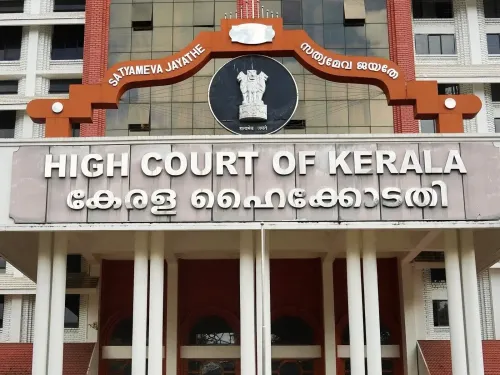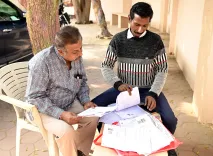Murshidabad Violence: Arrests in Father-Son Case Challenge State’s ‘Outsider’ Theory

Synopsis
Key Takeaways
- Four arrested suspects in Murshidabad violence were local residents.
- The initial 'outsider' theory has been debunked.
- Villagers confirmed the suspects frequently visited the area.
- Calcutta High Court criticized state measures for communal unrest.
- Earlier CAPF deployment might have prevented escalation.
Kolkata, April 21 (NationPress) The West Bengal government's initial ‘outsider’ theory concerning the communal violence in the minority-dominated Murshidabad district has been significantly undermined by the identities of the four individuals arrested in connection with the tragic killing of a man and his son on April 12.
It has come to light that all four arrested suspects were not only residents of Murshidabad district but also regularly visited the village where the deceased father and son, Hargobindo Das and Chandan Das, lived.
Additionally, villagers have confirmed that three of the four apprehended individuals were from neighboring villages adjacent to the one inhabited by the Das family.
The initial arrests were of two cousins, Kalu Nadab and Dildar Nadab, both hailing from a village close to the Das family's residence. Villagers informed investigating officials that these two cousins often visited the Das family to connect with friends there.
Kalu Nadab was taken into custody in Murarai in Birbhum district, while Dildar Nadab was apprehended in Suti within Murshidabad district.
Subsequently, police arrested a local electrician, Inzamam Haque, who, like the cousins, frequently visited the Das family's village for electrical repair services.
Moreover, the final arrest made late Saturday night was of Ziaul Haque, known as Chacha, who was also identified by villagers as a regular visitor to the area. He was apprehended late Saturday at Chopra in North Dinajpur district.
Residents in the affected areas had been discussing since the outset how the flash mob attacks occurred in various villages earlier this month. It was clear that the assailants were guided by individuals who belonged to the same communities or were familiar with the geography due to their frequent visits.
In fact, the Calcutta High Court’s special division bench led by Justice Soumen Sen, which mandated the deployment of Central Armed Police Forces in the troubled areas of Murshidabad on April 12, remarked that the actions taken by the West Bengal government to manage communal unrest were insufficient.
“While we acknowledge the state’s claim of striving for co-existence among various communities in peace and harmony, the measures implemented thus far do not seem satisfactory,” the order stated.
The division bench further noted that, had the CAPF been deployed sooner, the situation might not have escalated to such a ‘grave’ and ‘volatile’ state.










